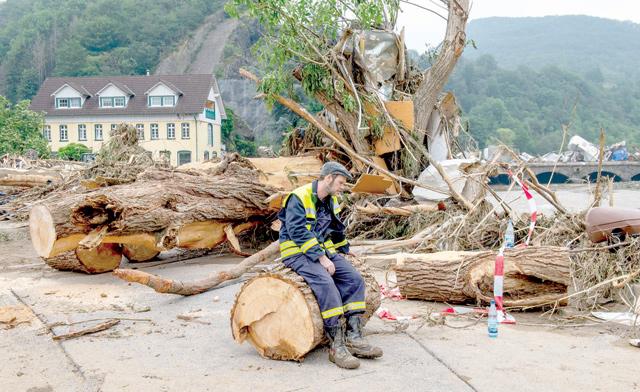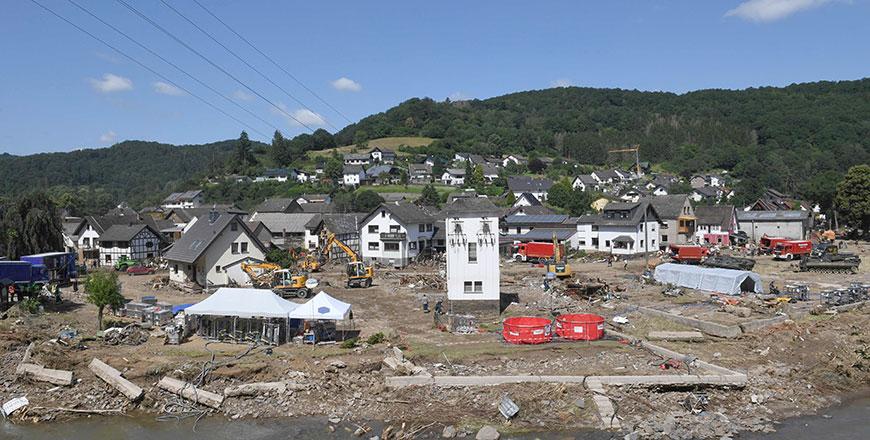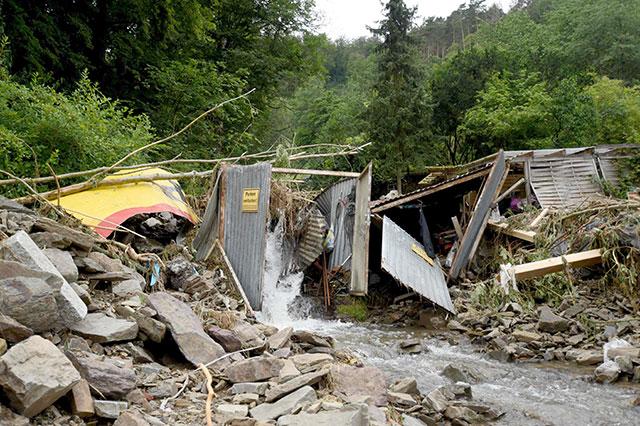You are here
Germany picks through rubble after deadly floods sweep western Europe
By AFP - Jul 18,2021 - Last updated at Jul 18,2021

A helper sits during clearing work on the cut trunk of an uprooted tree in the district Kreuzberg of Altenahr, western Germany, on Saturday after heavy rain hit parts of the country, causing widespread flooding and major damage (AFP photo)
ERFTSTADT, Germany — Rescue workers scrambled Saturday to find survivors and victims of the devastation wreaked by the worst floods to hit western Europe in living memory, which have already left more than 150 people dead and dozens more missing.
Western Germany has suffered the most brutal impact of the deluge that also pummelled Belgium, Luxembourg and the Netherlands, leaving streets and homes submerged in muddy water and isolating entire communities.
With the death toll in Germany at 133, three days into the disaster, rescuers said far more bodies were likely to be found in sodden cellars and collapsed homes.
"We have to assume we will find further victims," said Carolin Weitzel, mayor of Erftstadt, where a landslide was triggered by the floods.
In Germany's worst-hit states of North Rhine-Westphalia and Rhineland-Palatinate, residents who fled the deluge were gradually returning to their homes and scenes of desolation on Saturday.
"Within minutes, a wave was in the house," baker Cornelia Schloesser told AFP of the torrents that arrived in the town of Schuld, carrying her century-old family business with them.
"It's all been a nightmare for 48 hours, we're going round in circles here but we can't do anything," she said, surveying the heaps of twisted metal, broken glass and wood that have piled up at her former storefront.
In neighbouring Belgium, the death toll jumped to 24 with many people still missing.
Prime Minister Alexander de Croo was heading for the scene of what he has called "unprecedented" flood damage in the Meuse river basin. He has declared Tuesday a day of official mourning.
Luxembourg and the Netherlands were also hammered by heavy rains, inundating many areas and forcing thousands to be evacuated in the city of Maastricht.
'Immense' task
A burst dam in Germany's Heinsberg district 65 kilometres southwest of Duesseldorf overnight prompted the emergency evacuation of more than 700 residents.
In some affected areas, firefighters, local officials and soldiers, some driving tanks, have begun the colossal work of clearing the piles of debris clogging the streets.
“The task is immense,” said Tim Kurzbach, mayor of Solingen, a city in the south of the Ruhr area.
The real scale of the disaster is only now becoming clear, with damaged buildings being assessed, some of which will have to be demolished, and efforts under way to restore gas, electricity and telephone services.
The disruption to communication networks has complicated efforts to assess the number still missing, and most roads in the submerged Ahr Valley are out of service.
More than 90 of the dead lived in its Ahrweiler district, including 12 residents of a home for the disabled who drowned in the rising waters.
Roger Lewentz, interior minister for Rhineland-Palatinate, told local media up to 60 people were believed to be missing. More than 600 were injured.
The government has said it is working to set up a special aid fund, with the cost of damage expected to reach several billion euros.
Chancellor Angela Merkel, who returned Friday from a trip to Washington overshadowed by the disaster, vowed to provide “short and long-term support from the government” to stricken municipalities.
Her spokesman said Friday she was in close contact with regional leaders about “a visit soon to the scene of the catastrophe”.
The devastating floods have put climate change back at the centre of Germany’s election campaign ahead of a September 26 poll marking the end of Merkel’s 16 years in power.
President Frank-Walter Steinmeier urged a more “determined” battle against global warming in light of the disaster, ahead of a visit to Erftstadt on Saturday.
Armin Laschet from Merkel’s Christian Democratic Union, the frontrunner to succeed the veteran chancellor, spoke of “a disaster of historic proportions”.
News magazine Der Spiegel said the floods would put a spotlight on the candidates’ response to climate change.
“There will be affirmations in the coming days that it’s not an issue for the campaign but of course it is,” it said.
“People want to know how politicians will lead them through something like this.”
German reinsurance giant Munich Re said nations would have to expect rising “frequency and intensity” of natural disasters due to climate change, calling for preventive action “which, in the final analysis, will be less costly”.
Related Articles
SCHULD, Germany — Chancellor Angela Merkel said on Sunday that she was horrified by the "surreal" devastation in the flood-ravaged region of
MAYEN, Germany — Heavy rains and floods lashing western Europe have killed at least 42 people in Germany and left many more missing, as ris
BAD NEUENAHR-AHRWEILER, Germany — Germany on Thursday paid tribute to more than 180 people killed in severe floods a year ago, as those left

















